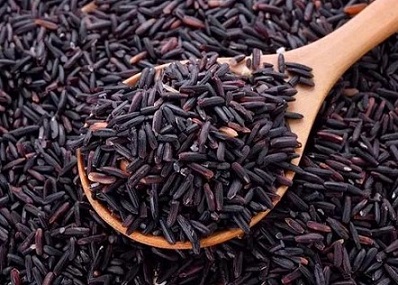Thailand medical researchers discover black rice anthocyanins may fight Alzheimer's disease
Nikhil Prasad Fact checked by:Thailand Medical News Team Aug 08, 2024 8 months, 6 days, 8 hours, 30 minutes ago
Thailand Medical: In a groundbreaking study, researchers from Chiang Mai University in Thailand have discovered that anthocyanins extracted from black rice can potentially protect against Alzheimer's disease. This
Thailand Medical News report dives into the details of their findings and how these natural compounds might offer hope in battling this neurodegenerative condition.
 Thailand medical researchers discover black rice anthocyanins may fight Alzheimer's disease
The Research Team and Study Background
Thailand medical researchers discover black rice anthocyanins may fight Alzheimer's disease
The Research Team and Study Background
The research was a collaborative effort involving experts from multiple departments at Chiang Mai University. The study's primary researchers included Sivanan Sivasinprasasn from the Department of Anatomy and the Office of Research Administration, Jiraporn Tocharus from the Department of Physiology, and Sugunya Mahatheeranont and Sarun Nakrat from the Department of Chemistry and the Center of Excellence for Innovation in Chemistry.
Alzheimer's disease (AD) is a prevalent neurodegenerative disorder affecting the elderly. Characterized by the accumulation of amyloid plaques and neurofibrillary tangles, AD leads to neuronal death and cognitive decline. The researchers aimed to explore the protective effects of anthocyanin-rich fractions of black rice bran (AFBRB) against amyloid beta (Aβ)-induced neurotoxicity.
Key Study Findings
The study revealed several significant findings:
-Reduction of Oxidative Stress: The AFBRB demonstrated a remarkable ability to reduce oxidative stress induced by Aβ in neuronal cells. Oxidative stress is a critical factor in the progression of Alzheimer's disease, contributing to neuronal damage and death.
-Protection Against ER Stress: Endoplasmic reticulum (ER) stress is another pathway leading to neuronal apoptosis in Alzheimer's. The study found that AFBRB effectively mitigated ER stress markers, suggesting a protective role against cellular dysfunction.
-Inhibition of Neuronal Apoptosis: Apoptosis, or programmed cell death, is a significant contributor to neurodegeneration in Alzheimer's disease. The AFBRB was shown to downregulate pro-apoptotic proteins and upregulate anti-apoptotic proteins, thereby reducing neuronal cell death.
Detailed Mechanisms of Action
The study explored the detailed mechanisms through which AFBRB exerts its protective effects:
-Reduction in Reactive Oxygen Species (ROS) Production: The AFBRB significantly decreased the levels of ROS in neuronal cells exposed to Aβ. This reduction in oxidative stress markers indicates that anthocyanins can protect cells from oxidative damage.
-Modulation of Apoptotic Pathways: The study observed changes in the expression of key apopt
otic proteins. AFBRB treatment resulted in a decreased expression of Bax (a pro-apoptotic protein) and an increased expression of Bcl-2 (an anti-apoptotic protein), leading to a reduced Bax/Bcl-2 ratio. This balance is crucial for preventing cell death.
-Attenuation of ER Stress Markers: The research showed that AFBRB downregulated the expression of several ER stress markers, including Grp78, ATF6, CHOP, PERK, p-elF2α, p-IRE1, and XBP-1. These proteins are involved in the cellular response to misfolded proteins and stress within the ER.
-Prevention of Caspase Activation: Caspases are enzymes that play a critical role in the execution of apoptosis. AFBRB treatment inhibited the activation of caspase-9 and caspase-3, thereby preventing cell death.
Implications for Alzheimer's Disease
The findings suggest that anthocyanins from black rice bran may offer a natural therapeutic option for Alzheimer's disease. By reducing oxidative stress, preventing ER stress, and inhibiting apoptosis, AFBRB could potentially slow the progression of neurodegeneration in Alzheimer's patients.
Conclusion
The study concludes that the anthocyanin-rich fraction of black rice bran holds promise as a therapeutic agent against Alzheimer's disease. The researchers highlight the need for further studies, including animal models and clinical trials, to confirm these findings and explore the potential of AFBRB in human health. As science continues to unravel the therapeutic potentials of traditional foods, such discoveries pave the way for innovative and accessible health solutions.
The study findings were published in the peer-reviewed journal: Pharmaceuticals.
https://www.mdpi.com/1424-8247/17/8/1039
For the latest Alzheimer’s Disease News, keep on logging to
Thailand Medical News.
Read Also:
https://www.thailandmedical.news/news/medical-news-columbia-university-study-shockingly-finds-that-herpes-simplex-2-infections-causes-brain-shrinkage-and-increases-risk-for-alzheimer-s-dis
https://www.thailandmedical.news/news/immunogenetics-creld1-gene-plays-a-critical-role-in-immune-system-even-in-the-context-of-covid-19-and-neurodegenerative-diseases-like-alzheimer-s
